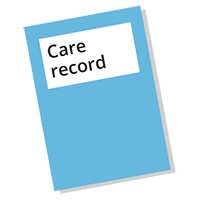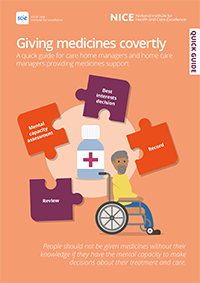A quick guide for care home managers and home care managers providing medicines support
Adults should not be given medicines covertly unless they have been assessed as lacking the mental capacity to make decisions about their health or medicines.
If they lack capacity to make these decisions and it is assessed as being in their best interests, they may need to be given medicines without their knowledge or consent (e.g. hidden in food or drink). Care staff need to be aware of the Mental Capacity Act and its Code of Practice and the Deprivation of Liberty Safeguards to protect both the person and themselves.
People should not be given medicines without their knowledge if they have the mental capacity to make decisions about their treatment and care.
Capacity and consent
Support people to make informed decisions about their medicines wherever possible.
If they decline their medicine and have the capacity to make these decisions, care staff should record that they have declined and the reason why (if a reason is given) on the medicines administration record (MAR). If this happens regularly or may present a risk to the person’s health, ask the prescriber to review the person’s treatment. It may be possible to stop the medicine or prescribe an alternative.

Look out for anything that might make it harder for the person to give or communicate informed consent and identify what support might help. Note this in the care record.
Things to consider include:
- mental health problems
- lack of capacity to make decisions
- health problems, including with vision or hearing
- difficulties reading, speaking or understanding English
- cultural differences.

Making a decision to give medicines covertly
A medicines policy, including a process for giving medicines covertly, should be in place. The process should cover:
Mental capacity assessment
If there are concerns about the person’s ability to give informed consent to take their medicines, an appropriate person (e.g. the prescriber) should carry out a mental capacity assessment. Check that care staff know where to go for advice if they feel a mental capacity assessment may be needed.
Best interests meeting
If the person does not have capacity to make decisions about their medicines, arrange a best interests meeting. The prescriber, in discussion with care staff, a pharmacist, and someone who can communicate the views and interests of the person, such as a family member or advocate, should decide whether the medicines can be stopped or given in a different form, or whether it is in the person’s best interests to be given the medicines without their knowledge. Check whether the person has made an advance decision. Medicines should not be given covertly unless agreed at this meeting.
Keeping records
Record the outcome of the mental capacity assessment and any decisions made during the best interests meeting. Note who was involved and agree where this record will be kept. Make sure the person’s care plan is updated to reflect the decisions made and to provide clear authorisation to care staff to give medicines without the person knowing.
Making a plan
Seek advice from a pharmacist to plan how each medicine can be safely given without the person knowing. The plan should ensure that any food or drink containing medicines cannot be consumed by another person. What instructions or training do care staff need to be able to put the plan into action? Have care staff providing medicines support been assessed as competent to administer the person’s medicines covertly?
Regular reviews
As a person’s capacity to make decisions about their medicines can fluctuate over time, the appropriate people (e.g. including the prescriber) should regularly review the decision to give medicines covertly to check whether it is still needed.
Urgent decisions
A best interests meeting should be held before any medicine is given without the person knowing. If a decision is needed urgently, this can be made in a discussion between the care staff, prescriber and family or advocate, as long as a formal best interests meeting is arranged as soon as possible. Record any decisions made.
Involving others
Care staff should be aware of the role of other professionals in any decision to give medicines covertly:

Prescriber (the person prescribing a medicine e.g. a doctor, pharmacist or nurse) to complete a medication review, which may help avoid the need for covert administration if the medicine can be stopped or given in a different form; to undertake a mental capacity assessment; and to lead on the best interests decision.

Pharmacist to help make the best interests decision and to give advice as to how the medicines can safely be given without the person’s knowledge. They can also undertake medicines reviews.

Attorney appointed for health and welfare decisions to represent the person and their preferences (lasting power of attorney).

Independent mental capacity advocate (IMCA) to give an independent view of what is in the person’s best interests, where the person lacks capacity and doesn’t have friends or family or an attorney to support them.
Useful links
- Managing medicines in care homes (SC1) (NICE guideline).
- Managing medicines for adults receiving social care in the community (NG67) (NICE guideline).
- Decision making and mental capacity (NG108) (NICE guideline).
- Mental Capacity Act 2005 and the Code of Practice (available from the Office of the Public Guardian).
- Covert administration of medicines (Care Quality Commission).

Download this guide
We've created a copy of this guide that you can print and share:
This content has been co-produced by NICE and SCIE and is based on NICE’s guidelines and quality standards on managing medicines in care homes and managing medicines for adults receiving social care in the community.